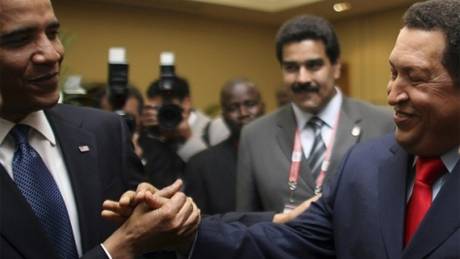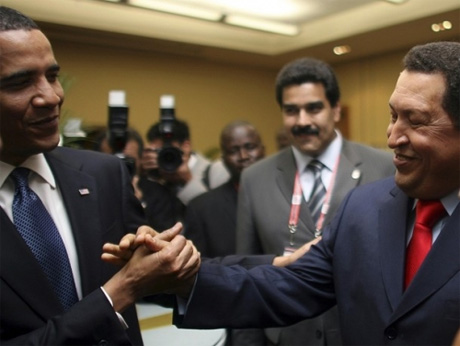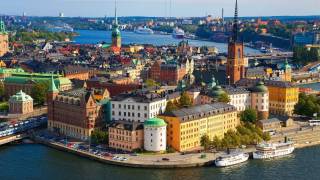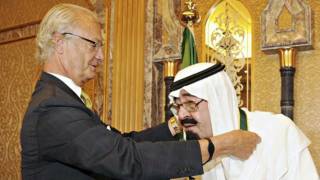Sweden Demands Answers on FARC Arms - Venezuela Still Aids FARC
Source: thelocal.se
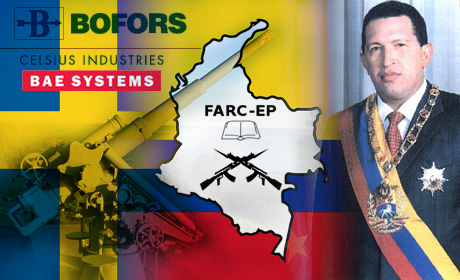
Sweden called on Venezuela on Monday to explain how Swedish-made weapons sold to the South American country ended up in the hands of Colombian FARC guerillas.
"We have asked the officials of the government of Venezuela to give us information on how they believe this material was found in Colombia," said Jens Eriksson, a political advisor to the Swedish Industry Ministry.
"We have it confirmed that a small amount of (defence) material made in Sweden has been found in a FARC camp," Eriksson said, stressing that no Swedish company had ever been granted a permit to sell to Colombia.
Later on Monday, Colombian Vice President Francisco Santos said a number of anti-tank weapons had been seized from FARC rebels, adding that they had been purchased by Venezuela in Europe.
"In several operations in which we have recovered weapons from the FARC, we've found powerful ammunition (and) powerful equipment, including anti-tank weapons which a European country sold to Venezuela and which turned up in the hands of the FARC," Santos told Colombia's Caracol radio.
The FARC is Latin America's oldest and largest insurgency, and has been battling the government in Bogota for 45 years.
On Monday, Venezuela's Interior Minister Tareck El Aissami denounced Sweden's statements as a "new attack" against his country, while Foreign Minister Nicolas Maduro described them as a way for neighboring Colombia to "justify" its recent military pact with the United States.
An agreement announced earlier this month allowing US forces to use three Colombian military bases for South American anti-drug operations has heightened tensions between Colombia and its neighbors Venezuela and Ecuador.
Colombian President Alvaro Uribe on Monday warned that the FARC "now are seeking to buy some surface-to-air devices to try and shoot down our planes," and asked for help from the international community to thwart such attempts.
Jane's Defence Weekly reported on July 20 that the weapons in question were AT4 rocket launchers produced by Saab Bofors Dynamics in Sweden.
Related: Bofors Scandal
Chief executive Tomas Samuelsson confirmed the weapons found by Colombian authorities were indeed made by the company.
"We have been informed that our weapons have been found in the camp," he told AFP.
"All countries that we export to have to sign an 'end user' certificate otherwise export will not be permitted. Unfortunately, sometimes a weapon shows up where it shouldn't be but that is very rare. When that happens, it is normally theft," Samuelsson said.
Saab Bofors Dynamics is a subsidiary of the Swedish defence company Saab - a separate company from the automaker of the same name - that employs 13,300 people worldwide.
Source: thelocal.se
Venezuela Still Aids Colombia Rebels, New Material Shows
From: nytimes.com
Despite repeated denials by President Hugo Chávez, Venezuelan officials have continued to assist commanders of Colombia’s largest rebel group, helping them arrange weapons deals in Venezuela and even obtain identity cards to move with ease on Venezuelan soil, according to computer material captured from the rebels in recent months and under review by Western intelligence agencies.
The materials point to detailed collaborations between the guerrillas and high-ranking military and intelligence officials in Mr. Chávez’s government as recently as several weeks ago, countering the president’s frequent statements that his administration does not assist the rebels. “We do not protect them,” he said in late July.
The new evidence — drawn from computer material captured from the rebel group, the Revolutionary Armed Forces of Colombia, or FARC — comes at a low point for ties between Venezuela and Colombia. Mr. Chávez froze diplomatic relations in late July, chafing at assertions by Colombia’s government that Swedish rocket launchers sold to Venezuela ended up in the hands of the FARC. Venezuela’s reaction was also fueled by Colombia’s plans to increase American troop levels there.
“Colombia’s government is trying to build a case in the media against our country that serves its own political agenda,” said Bernardo Álvarez, Venezuela’s ambassador in Washington, describing the latest intelligence information as “noncorroborated.”
Mr. Chávez has disputed claims of his government’s collaboration with the rebels since Colombian forces raided a FARC encampment in Ecuador last year. During the raid, Colombian commandos obtained the computers of a FARC commander with encrypted e-mail messages that described a history of close ties between Mr. Chávez’s government and the rebel group, which has long crossed over into Venezuelan territory for refuge.
The newest communications, circulated among the seven members of the FARC’s secretariat, suggest that little has changed with Venezuela’s assistance since the raid. The New York Times obtained a copy of the computer material from an intelligence agency that is analyzing it.
One message from Iván Márquez, a rebel commander thought to operate largely from Venezuelan territory, describes the FARC’s plan to buy surface-to-air missiles, sniper rifles and radios in Venezuela last year.
It is not clear whether the arms Mr. Márquez refers to ended up in FARC hands. But he wrote that the effort was facilitated by Gen. Henry Rangel Silva, the director of Venezuela’s police intelligence agency until his removal last month, and by Ramón Rodríguez Chacín, a former Venezuelan interior minister who served as Mr. Chávez’s official emissary to the FARC in negotiations to free hostages last year.
In the message, Mr. Márquez discusses a plan by Mr. Rodríguez Chacín to carry out the deal near the Río Negro in Amazonas State in Venezuela. Mr. Márquez goes further, explaining that General Rangel Silva gave the arms dealers documents they could use to move around freely while in Venezuela.
Intelligence of this kind has been a source of tension between Colombia and Venezuela, with the government here claiming the information is false and used to further political ends. Colombian officials, by contrast, argue that the intelligence proves that the FARC survives in part on its ability to operate from Venezuela’s frontier regions.
The latest evidence, suggesting that the FARC operates easily in Venezuela, may put the Obama administration in a tough spot. President Obama has recently tried to repair Washington’s relations with Venezuela, adopting a nonconfrontational approach to Mr. Chávez that stands in contrast to the Bush administration’s often aggressive response to his taunts and insults.
But the United States and the European Union still classify the FARC as a terrorist organization. The Treasury Department accused General Rangel Silva and Mr. Rodríguez Chacín last year of assisting the FARC’s drug trafficking activities, opening the officials to freezes on their assets, fines and prison terms of up to 30 years in the United States. Venezuela has said the men are not guilty of those charges.
“We do not comment on intelligence matters,” said Noel Clay, a State Department spokesman, in relation to the latest captured communications. A spokesman from the Colombian Foreign Ministry declined to comment on the matter.
Computer records obtained in the Colombian raid in Ecuador last year appeared to corroborate the assertion that Venezuela helped the FARC acquire the Swedish-made rocket launchers at the heart of the latest diplomatic dispute between the two countries. The launchers were purchased by the Venezuelan Army in the late 1980s but captured in Colombia in combat operations against the FARC last year.
The FARC’s use of Swedish arms has an added dimension: the rebels kidnapped a Swedish engineer in Colombia in 2007, holding him hostage for nearly two years — during which he was reported to have suffered brain damage and paralysis from a stroke — before releasing him in March.
“The issue of these weapons is extremely serious for us,” said Tommy Stromberg, the political officer at the Swedish Embassy in Bogotá, the Colombian capital, which also oversees Sweden’s affairs in Venezuela. Mr. Stromberg said Venezuela had bought Swedish arms as recently as 2006. “We have asked Venezuela’s Foreign Ministry for clarification on how this happened, but have not had a response.”
The computer records from the raid in Ecuador last year also seem to match some of the information in the new communications under review by Western intelligence officials.
For example, a message obtained in the Ecuador raid and written in September 2007 contained an earlier reference to the arms deal discussed recently by the FARC. In the earlier message, Mr. Márquez, the rebel commander, referred to dealers he described as Australian, and went into detail about the arms they were selling, including Dragunov rifles, SA-7 missiles and HF-90M radios, the same items he discusses in the more recent communications.
Another file from the Ecuador raid mentioning an offer from the FARC to instruct Venezuelan officers in guerrilla warfare matches recently obtained material from a rebel commander, Timoleón Jiménez, that says the course took place. Other communications refer to FARC efforts to secure Venezuelan identity cards in a plan overseen by General Rangel Silva, the former Venezuelan intelligence chief.
In other material captured as recently as May, Mr. Márquez, the rebel commander, said Mr. Chávez had spoken personally with Mr. Jiménez, expressing solidarity for the FARC’s struggle. Then Mr. Márquez went into more mundane matters, referring to unspecified problems the FARC had recently encountered in La Fría, an area in Venezuela near the border with Colombia.
Source: nytimes.com
FARC - Revolutionary Armed Forces of Colombia
From: wikipedia.org
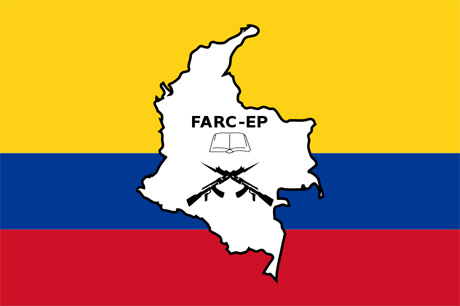
The Revolutionary Armed Forces of Colombia – People’s Army (Spanish: Fuerzas Armadas Revolucionarias de Colombia – Ejército del Pueblo), also known by the acronym of FARC or FARC-EP, is a self-proclaimed Marxist-Leninist revolutionary guerrilla organization.
FARC is a Violent non-state actor (VNSA), considered a terrorist group by the Colombian government, the United States Department of State, Canada and the European Union. Other governments, including the Cuban and Venezuelan governments, are more sympathetic to FARC.[6] Venezuelan President Hugo Chávez publicly rejected their classification as "terrorists" in January 2008, considering them to be "real armies", and called on the Colombian government and international community to recognize the guerrillas as a “belligerent force”, arguing that this would then oblige them to renounce kidnappings and terror acts in order to respect the Geneva Conventions.
FARC was established in the 1960s as the military wing of the Colombian Communist Party and thus originated as a guerrilla movement. The group later became involved with the cocaine trade during the 1980s to finance itself, but remained closely tied to the Communist Party even as it created the Patriotic Union in the early 1980s and later a political structure it calls the Clandestine Colombian Communist Party (PCCC).
FARC remains the largest as well as the oldest insurgent group in the Americas. According to the Colombian government, as of 2008, FARC had an estimated 6,000-10,000 members, down from 16,000 in 2001, having lost about half their fighting force after President Álvaro Uribe took office in 2002. However, in 2007 FARC Commander Raul Reyes claimed that their force consisted of 18,000 guerrillas.
FARC-EP was present in around 15-20 percent of Colombia’s territory during 2005, its largest concentrations being located throughout the southeastern parts of Colombia's 500,000 square kilometers (193,000 square miles) of jungle and in the plains at the base of the Andean mountains.
FARC has faced criticism expressed through large rallies across Colombia during 2008, and Venezuelan President Hugo Chavez has also expressed his disagreement with their resorting to kidnappings and armed struggle.
Source: wikipedia.org
